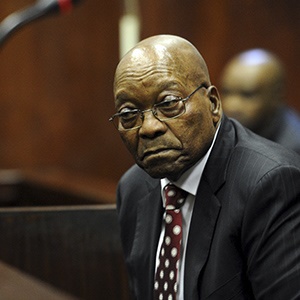
The more things are claimed to change the more they remain resolutely the same.
Last week the never-ending saga concerning the criminal trial of former president Jacob Zuma on 16 charges of corruption and racketeering was debated in the Pietermaritzburg High Court. Zuma's new and significantly enlarged legal team told the court that the Stalingrad tactics made notorious by Zuma's previous lead counsel Kemp J Kemp SC were a thing of the past. That the new team wanted to progress the litigation to finality appeared to be the message that was conveyed in open court.
But without so much as a forensic blush of embarrassment, Mike Hellens SC, Zuma's new lead counsel, announced that Zuma would now seek a permanent stay of prosecution. This course of legal action is clearly Zuma's right but it does seem to be exactly the course of action that the previous legal team had in mind when it effectively threw in the towel before the Supreme Court of Appeal (SCA) and conceded that the decision by Mokotedi Mpshe to withdraw charges against Zuma in 2009 was irrational.
Once the SCA had decided against Zuma and the National Prosecution Authority (NPA), Zuma's lawyers immediately announced that they would make further representations to Shaun Abrahams as to why he should not prosecute. It seemed obvious at the time that if Abrahams rejected these representations (as surprisingly did happen), Zuma's lawyers would either seek to review this decision or apply for a permanent stay of prosecution, either of which course of action would open the possibility to further applications for leave to appeal in the event that the initial court application was dismissed. "Delay the fateful day" was clearly the motto.
In short, the Stalingrad manual of legal warfare remains very much in use for the application for a permanent stay opens serious appeal possibilities. Winning a permanent stay may not, however, prove to be easy. The Constitutional Court has said the following about a permanent stay which would end this litigation against an accused like Zuma:
"The courts will apply their experience of how the lapse of time generally affects the liberty, security and trial-related interests that concern us. Of the three forms of prejudice, the trial-related variety is possibly hardest to establish, and here as in the case of other forms of prejudice, trial courts will have to draw sensible inferences from the evidence. By and large, it seems a fair although tentative generalisation that the lapse of time heightens the various kinds of prejudice that Section 25(3)(a) (the constitutional right to a fair trial) seeks to diminish."
Compounding the problem for Zuma is that the various components of the argument outlined by Hellens before the High Court in justification of a permanent stay is the judgment of the SCA of last year in Zuma v DA. In that case, Kemp had argued many of these same points, albeit to show that the discretion to desist from prosecution was not irrational. The motive of the NPA at the time, the legality of the recorded conversations, the now discredited Browse Mole report (regarding plans to destabilise the country) and possible influence by former president Thabo Mbeki were all before the SCA when it held that the decision to terminate the Zuma prosecution was irrational and had to be set aside.
But even if these same arguments, albeit packaged differently, have merit, the further question of delay is an even greater obstacle. For a decade Zuma has litigated to ensure that no criminal trial regarding the 16 charges would ever take place. In short, his litigation strategy is the key reason for why the trial has been delayed for a decade. To find that Zuma is now prejudiced by delays caused by his own conduct, aided and abetted by a compromised NPA, is to reward the Stalingrad litigation strategy.
That would introduce a troubling principle into our law which would hold significant future implications. Take the possible criminal proceedings that may well follow the Steinhoff debacle. Hugely wealthy accused would have the resources to tie up the criminal justice system for years as imaginative strategies to argue interlocutory points were pursued. Then a decade later, it could be argued that the accused are prejudiced by the inordinate delay in commencing with the criminal trial and are deserving of a permanent stay.
The fundamental principle which should guide the determination of this issue is whether reasonable and probable grounds for prosecution are present and whether the criminal trial cannot now proceed fairly. At the same time, it should be borne in mind that it is clearly in the interests of society that a trial involving serious charges determine whether the former president of South Africa did contravene the criminal law of this country.
It may well be that Zuma's legal team is able to produce additional evidence to negotiate these stiff hurdles. That is uncertain and remains for the courts to determine. What should be certain is that the taxpayer should not have to foot the bill for a team of five counsel, or for the costs of further appeals should this latest move fail.
- Serjeant at the Bar is a senior legal practitioner with a special interest in constitutional law.
Disclaimer: News24 encourages freedom of speech and the expression of diverse views. The views of columnists published on News24 are therefore their own and do not necessarily represent the views of News24.




 Publications
Publications
 Partners
Partners
























